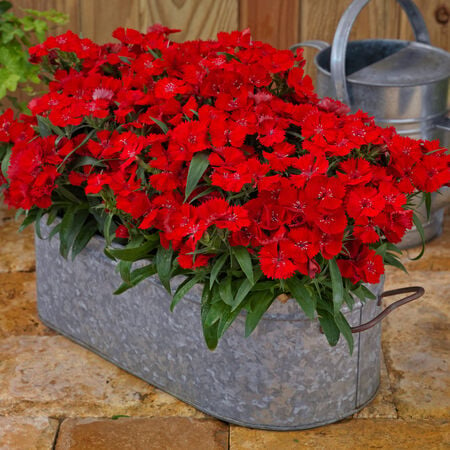Scarlet Diamond, Dianthus
Key Attributes
Key Attributes
Product Details
Weight
0.008Depth
0.2Height
4.5Width
3.25Plant Height
6-12"Botanical Name
F1 Dianthus x hybrida nanaSeed Type
SeedAdditional Characteristics
Ground Cover, Extended Blooms, Deer ResistantSeeds Per Gram
1,147Seeds Per Pound
520,000Packet
50 SeedsSow Depth
1/8"Seeds Per Ounce
32,500Breed
F1 HybridSun
Partial ShadeGrowing Conditions
Container FriendlyUses
Cut FlowersLife Cycle
AnnualSow Method
TransplantCategories
FlowersDays To Maturity (# Days)
95Components
Growing Instructions
![]() Learning Download: How to Grow Dianthus
Learning Download: How to Grow Dianthus
Dianthus is a compact flower that grows well in containers or in the garden. Many varieties of the flower are a perennial, meaning it will come back year after year.
Before Planting: Begin Dianthus seeds indoors up to eight weeks before the last frost. Cover seeds lightly with soil and space them 10 inches apart. They should germinate in 10 to 21 days.
Planting: Dianthus can be planted outdoors in the spring after frost or in the autumn before frost.
Watering: Water Dianthus normally, but don’t get water on the leaves.
Fertilizer: Dianthus is typically a carefree plant, but it will benefit from fertilizer. Add a complete fertilizer each spring before blooming begins.
Days to Maturity: Depending on the variety, Dianthus will blossom from May to August.
Harvesting: When cutting Dianthus, leave an inch or so of the stem above the ground. Harvest the flowers when blooms are still closed and don’t cut the stems in the middle of a hot day.
Tips: Deadhead the Dianthus to prevent self-sowing. Deadheading also encourages additional blooming.
Shipping Schedule
Our Seed Promise
 "Agriculture and seeds" provide the basis upon which our lives depend. We must protect this foundation as a safe and genetically stable source for future generations. For the benefit of all farmers, gardeners and consumers who want an alternative, we pledge that we do not knowingly buy or sell genetically engineered seeds or plants.
"Agriculture and seeds" provide the basis upon which our lives depend. We must protect this foundation as a safe and genetically stable source for future generations. For the benefit of all farmers, gardeners and consumers who want an alternative, we pledge that we do not knowingly buy or sell genetically engineered seeds or plants.
The mechanical transfer of genetic material outside of natural reproductive methods and between genera, families or kingdoms, poses great biological risks as well as economic, political, and cultural threats. We feel that genetically engineered varieties have been insufficiently tested prior to public release. More research and testing is necessary to further assess the potential risks of genetically engineered seeds. Further, we wish to support agricultural progress that leads to healthier soils, to genetically diverse agricultural ecosystems, and ultimately to healthy people and communities.
To learn more about the "Safe Seed Pledge" please visit www.councilforresponsiblegenetics.org.

